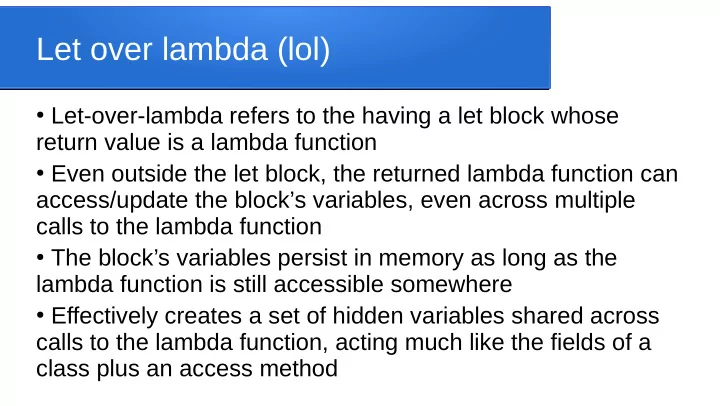

Let over lambda (lol) ● Let-over-lambda refers to the having a let block whose return value is a lambda function ● Even outside the let block, the returned lambda function can access/update the block’s variables, even across multiple calls to the lambda function ● The block’s variables persist in memory as long as the lambda function is still accessible somewhere ● Effectively creates a set of hidden variables shared across calls to the lambda function, acting much like the fields of a class plus an access method
Lol example ● Have a let block (with local variables) return a lambda function, store that in a variable, f – the lambda function increments and displays the let block variable (defvar f (let ((x 1)) (lambda () (setf x (+ x 1)) (format t “x is ~A~%” x))) ● Call the function repeately through f (funcall f) X is 2 (funcall f) X is 3
How/why it works ● All lists in lisp are dynamically allocated in the heap, and pointers are used to keep track of them ● A list won’t be deallocated until there are no more pointers to it (or to elements in it), then lisp automatically deletes it ● The list of local variables in a let block is such a dynamically allocated list, and if the lambda function uses those variables then it has pointers into the list ● As long as the lambda function still exists, its pointers still exist, so the let block’s local variable list is kept alive someplace in the heap
More useful lambdas with lol ● Suppose we add parameters to the lambda function that allow the user to specify different things they want done to the ‘hidden’ variables ● Perhaps one command parameter and an option parameter ● The user can call the lambda function repeatedly, having it take different actions on the data over time, e.g. increment, decrement, print, return, etc
Simple example with circles ● Let block variables store the radius of a circle, default value 1, and the lambda function can update it or print it (default action) (defvar f (let ((r 1)) (lambda (cmd &optional (arg 1)) (cond ((equal cmd ‘set) (setf r arg)) (t (format t “r is ~A~%” r)))))) (funcall f ‘set 5) (funcall f ‘print) r is 5
Combine lol with closures ● Now suppose we had a function, builder, containing the let block from the previous slide and returning its lambda ● The function could take a set of parameters that it used to initialize the let block variables and to customize the lambda function that would be returned, e.g. (defun builder (initialRval areFloatsAllowed) ..setup code and a new fancier let block here..) (defvar f (builder 23.5 t))
Our function acts like a constructor ● Every call to a function has its own local variable space ● so every call to builder has its own local variable space (defvar f (builder 23.5 t)) (defvar g (builder 5 nil)) ● F works on the local variable list allocated for the first call, while g works on the local variable list for the second call ● They’re completely independent ... builder is acting much like a constructor in OO languages
Circle example ● Let’s have our lambda function maintain/process data about a circle: the x,y coordinates of the centre and the radius (we’ll call the construction function buildCircle) ● The user can give the lambda function commands to print the info, update the coordinates, update the radius, or return the area (defvar c1 (buildCircle 5 3 24)) ; x=5, y=3, r=24 (defvar c2 (buildCircle 0 0 1)) ; x=0, y=0, r=1 (funcall c1 ‘print) (5,3):24
buildCircle “constructor” (defun buildCircle (&optional (xInit 0) (yInit 0) (rInit 1)) (let ; start with valid default values ((x 0) (y 0) (r 1)) ; update from parameters if they are valid (if (realp xInit) (setf x xInit)) (if (realp yInit) (setf y yInit)) (if (and (realp rInit) (> rInit 0)) (setf r rInit)) ; lambda function expects a command and possibly an arg (lambda (cmd &optional (arg nil)) (cond ; check/process each command type
The lambda function ; check for/process print commands ((equalp cmd ‘print) (format t “(~A,~A):~A~%” x y r)) ; check for/process area commands, return pi r^2 ((equalp cmd ‘area) (* 3.14 r r)) ; check for/process set-radius commands ((equalp cmd ‘radius) (if (and (realp arg) (> arg 0)) (setf r arg) (format t “Error: invalid radius ~A~%” arg)))
lambda function cont. ; check for/process set-coords commands ((equalp cmd ‘coords) ; need to make sure arg is a list of two reals (if (and (listp arg) (= (length arg) 2) (realp (car arg)) (realp (cadr arg))) ; arg looks ok, set x and y (setf x (car arg)) (setf y (cadr arg)) (format t “Error: invalid coords ~A~%” arg))) ; anything else is a bad command (t (format t “bad command ~A~%” cmd))))); end of buildCircle
Recommend
More recommend